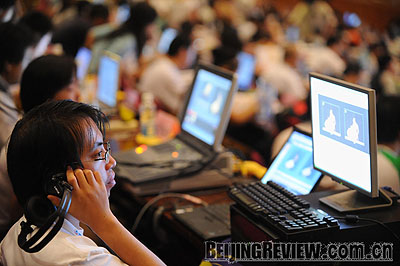| Numbers of the Week
3/4
The National Bureau of Statistics said more than three quarters of the country's urban employees worked in non-public enterprises in 2007-a situation that is continuing this year.
977 million
By the end of September, the number of telephone users in China had surpassed 977 million, while 79.35 million households had Internet access.

TO THE POINT: China is counting on large infrastructure investment-railways in particular-to propel its slowing economy and boost employment to fend off the effects of the global economic downturn. Liu Yongxing, an agricultural feed producer with $3 billion in assets, was named the richest man in China by Forbes magazine. In the wake of shrinking steel demand, major steel mills will continue to cut their output in December, while experts say they will report losses in the fourth quarter. China's dairy industry remained weak from the fallout of the melamine-tainted milk scandal, which involved nearly all the country's milk producers. The country's foreign exchange watchdog said it will monitor cross-border capital flows more strictly.
By LIU YUNYUN and HU YUE
Railways to the Rescue
To help prevent the country's economy from being battered by the global economic downturn, the government has decided to invest heavily in railway construction to propel economic development.
At a State Council conference on October 21, Wang Yongping, Spokesman of the Ministry of Railways, said since 2006 the State Council had approved 2 trillion yuan ($293 billion) worth of investment for railway construction, 60 percent more than the targeted investment amount set in the 11th Five-Year Plan (2006-10).
"And the investment will further enlarge when construction deepens," Wang said.
During the 1997-98 Asian financial crisis, the Chinese Government strove to boost domestic demand and consumption by building roads and expressways, which successfully helped the country weather the storm and at the same time optimized the transportation system.
A decade later, the government has chosen to rely on railway development in a bid to defeat a new round of global economic recession. Experts believe that railway construction not only will improve the nation's rail transportation system, but also more importantly will spur demand for steel, concrete, machinery, non-ferrous metals and electric facilities. In addition, "railway construction would create over 1.5 million jobs," He Huawu, Chief Engineer of Ministry of Railways, told the 21st Century Business Herald.
Richest Man in China
Agricultural feed tycoon Liu Yongxing was named the richest man in China on the Forbes China Rich List, overtaking property giant Yang Huiyan.
Liu, 60, started amassing his fortune in 1982 when he and his three brothers took $120 from their savings to raise quails and chickens. Gradually, Liu expanded the business to other agriculture-related products such as feeding materials, and started producing aluminum.
This year, Forbes estimated Liu's net assets at 20.4 billion yuan ($3 billion), a 13-percent increase from last year when he was ranked the 20th richest person in China.
The country's rich became a little poorer amid the economic downturn this year. The stock market plunge and global financial crisis slashed the combined net worth of the 400 wealthiest people of China by nearly 40 percent year on year, which dropped to $173 billion this year.
There are 24 billionaires on this year's list, down from a record 66 last year. The losses would have been larger if it had not been for the yuan's 10-percent appreciation against the dollar, the Forbes report said.
Baosteel to Cut Output
Baosteel Group Corp., China's leading steel producer, will reduce its output in the following months because of sluggish international and domestic demand and falling prices.
Other major mills, including Capital Steel & Iron Corp. and Wuhan Iron and Steel (Group) Corp., made earlier announcements that they were reducing their output. Altogether 23 large and medium-sized steel producers reported losses in September, accounting for 32.4 percent of the country's total, said Su Lifeng, an industry analyst at Guoyuan Securities Co. Ltd., in an interview with the China Securities Journal. Su said the entire steel industry would suffer losses in the fourth quarter.
In the first half of this year, domestic steel mills reported high earnings thanks to surging steel prices. But they suffered a dramatic profit slump in the third quarter, when the world economy was undermined by the sweeping financial crisis. Figures from the China Iron and Steel Association (CISA) indicated that the profitability of mills in the third quarter dropped 40 percent compared with that of the first half. The CISA predicted that the number of loss-making steel manufacturers would continue to increase as the global credit crunch deepened.
| 